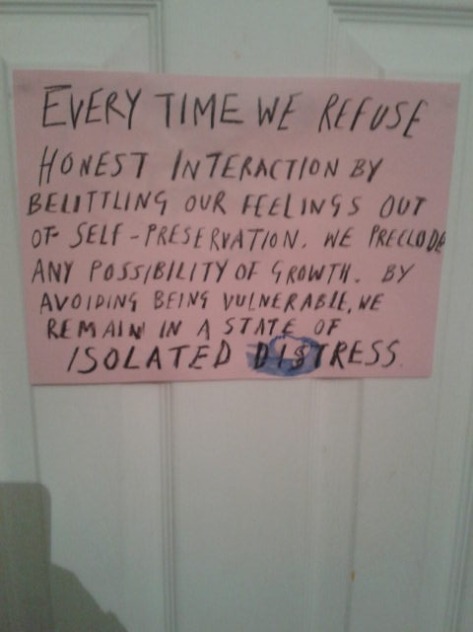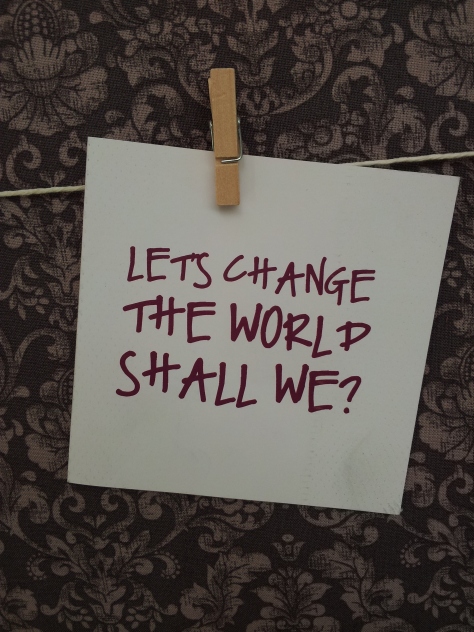I don’t feel very strong, so it always amazes me when people ask me where I get my strength from. The same with courage. I don’t feel brave. I feel terrified.
I’m terrified that I’ll never get well again. That this is my lot now, staying awake staving off panic attacks with pharmaceutical drugs and self-harm, and drifting through my days, exhausted and melancholic.
It sounds dramatic. Of course it does, I’m a writer, I always want to choose the words with the most impact. But I’m not lying. I’m being real.
When I first got out of hospital I saw a therapist whose job it was to help me come to terms with my illness. I didn’t want to do that. All I wanted to do was learn how to get back to where I was before. We talked a lot about how being ill had made me vulnerable, because it meant I had to ask for help. I had to share what was going on for me instead of stuffing it all away and pretending I was fine, which I’m very good at doing.
I was lucky enough to be granted another appointment with her this last week, as usually you are only allowed 4 a year, due to their extreme patient overload (yay government, let’s keep cutting mental health services funding!)
Despite the fact that I have been in and out of hospital and mental health care, am on a cocktail of drugs, and am self-harming, Georgia* thinks I’m doing well. In fact, she thinks I’m doing really, really well.
Through her eyes I could see some of the progress I had made. I used to spend a lot of time focusing on what I had lost due to my illness, and how I could get it back. I still feel sad about this, of course – I feel frustrated every single fucking day about the things I can’t do. But I have more acceptance. I know I can’t go back – and I don’t want to. I want to go forward. I want to use everything I’ve learned from being sick, to change my life for the better. And to help others.
Georgia talked to me about the importance of “strengths-based conversations.” She suggested that when I dwell in my illness, I help perpetuate it. So she said I should I write more about what’s working for me. What helps me. This might help others too.
I’ve spoken before about the physical side of my illness and some of the ways I’m working with that. The two go hand-in-hand of course but I’m going to talk a bit about how I cope with my brain.
This is a piece my friend Jem made to show some of the feeling of chronic fatigue. My illness definitely feels like this, both mentally and physically.
Some ways I cope
1. Talk therapy – Unfortunately I can’t have as much of this as I would like, because I can’t afford it. But I’ve been seeing counsellors and psychologists since I was 9 and without them I wouldn’t still be here. It doesn’t work for everyone, but I recommend at least trying it. You can work through why and how your brain works, deal with trauma, have a chance to just speak without being judged, and they can also provide useful tools for coping when you get into a dark place.
2. Medication – Again, not for everyone, and I personally don’t see it as a solution on its own. I would love to not be on any drugs but that’s not really an option for me right now.
3. Friends – There’s nothing more important to me. I’ve had to learn to reach out for help, and my friends have been unfailingly supportive. People *like* to help – let them.
4. Exercise – It’s a cliche but even a small walk to the end of my street and back can really help my mood. Walking helps me process things and I definitely get worse mentally if I stay inside for days on end. I know these things are hard to do when you’re struggling – god do I know. A lot of the time right now I want nothing more than to crawl into bed and stay there forever. But just doing small things as you can will help.
5. Meditation – I do a guided bodyscan meditation, which is a voice that leads you through becoming aware of, and relaxing, each part of your body. It helps me calm down when I’m manic, and can offset panic attacks. Also good for sleep.
6. Small nice things – Be kind to yourself. Do the little things that make you happy. Make a card. Have a cup of chamomile. Eat some chocolate. Take a bath. Remind yourself that you’re on a journey and it’s ok to have bad patches.
7. Giving. Being vulnerable. – The last week on Twitter has shown me that I have made myself incredibly vulnerable by sharing my real experiences with people. This has caused some pain for me, but I don’t regret it. You can build honest connections with people when you’re open. Being vulnerable about your experience can actually be really empowering. Reach out – people will reach back, trust me.
I hope some of this helps.




I LOVE that picture! So brilliant.
Any time I have an assessment there’ll be something in the notes about how motivated I am, how much I’ve improved or how much potential I have. It definitely feels weird to look at how much I’m not capable of and wonder what the hell the doctors are so positive about, but then, I guess even the fact that I’m not actively suicidal right now is an achievement, and objectively I am doing a lot more than I was in 2010, even if I’ve also been on the verge of breaking down. But with mental illness even having long term plans is difficult. There’ve been times when I thought I wouldn’t make it to 30, whereas now I’m looking at finishing studying a few months after my 30th birthday if I can maintain the workload. I’ve lost ten years to this thing but when I graduate I’ll be a lot stronger for it. I just need to remember that in the meantime.